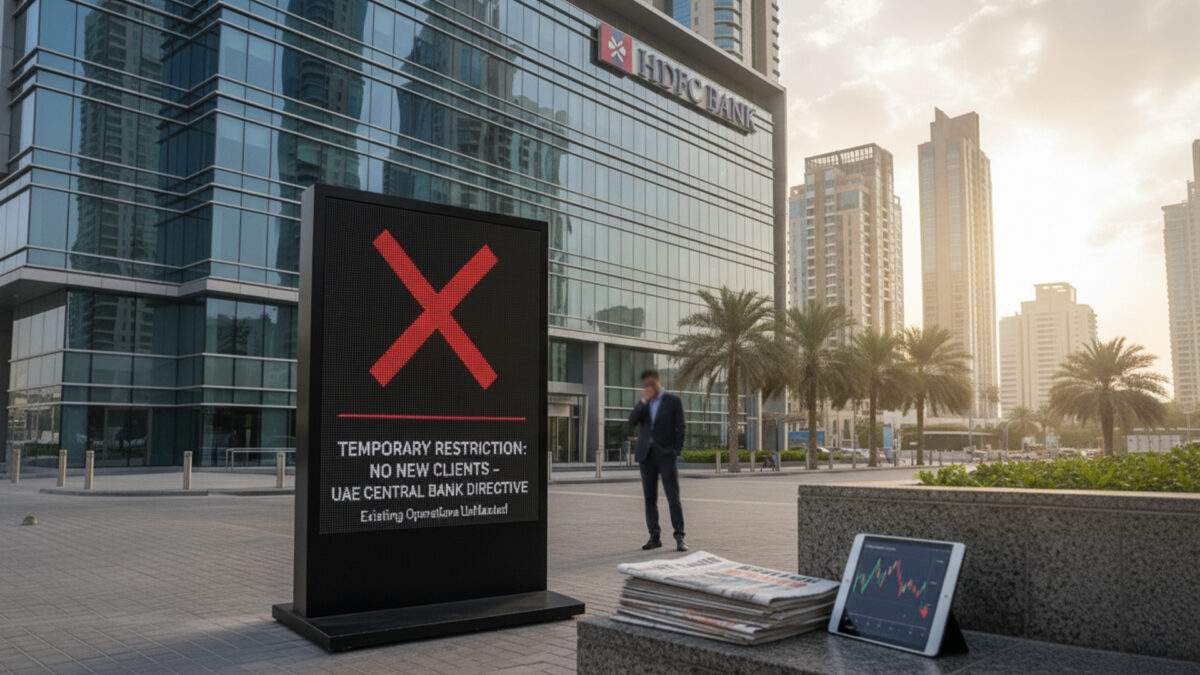The United Arab Emirates (UAE) Central Bank has directed HDFC Bank’s Dubai branch to stop onboarding new customers with immediate effect, intensifying scrutiny on the Indian lender’s overseas operations.
The move follows an inspection that flagged concerns around compliance with anti-money laundering (AML) and counter-terrorist financing (CTF) regulations, according to people familiar with the development.
The regulatory action means HDFC Bank, India’s largest private sector lender by market capitalisation, will not be able to add new corporate or retail clients at its Dubai International Financial Centre (DIFC) branch until further notice.
Existing operations, however, will continue as usual, ensuring that current customers are not impacted by the directive.
The development comes at a time when HDFC Bank is navigating heightened regulatory oversight both in India and abroad.
Earlier this year, the Reserve Bank of India (RBI) flagged issues in the bank’s digital operations and customer onboarding processes, temporarily halting its plans to launch new digital initiatives.
While most of those restrictions have since been eased, the RBI continues to keep the bank under close watch.
In Dubai, the Central Bank’s action is viewed as part of a broader effort to tighten supervision of foreign banks and ensure strict adherence to AML and CTF guidelines, which have been a priority for regulators in recent years.
The UAE has been under pressure from global watchdogs such as the Financial Action Task Force (FATF) to strengthen its monitoring mechanisms, and authorities have taken a tougher stance on compliance lapses.
For HDFC Bank, the latest restriction represents another regulatory setback in its international ambitions.
The lender, which completed its high-profile merger with Housing Development Finance Corporation (HDFC Ltd) in 2023, has been working to expand its global footprint, particularly in regions with significant Indian diaspora populations such as the Middle East.
Its Dubai branch, operational since 2019 under a Category 1 licence from the Dubai Financial Services Authority, was seen as a key part of this strategy.
Analysts suggest that while the immediate financial impact may be limited, reputational risks remain significant. “HDFC Bank has been positioning itself as a global player, and regulatory restrictions in international markets could dent investor confidence,” said a banking sector analyst, noting that the bank’s stock has been under pressure in recent trading sessions.
The bank has not issued a detailed public statement on the matter but is understood to be engaging closely with UAE authorities to resolve the issues raised during the inspection. Industry observers say the outcome of these discussions will be closely watched, not only by HDFC Bank’s stakeholders but also by other Indian banks operating in overseas jurisdictions.
With regulatory scrutiny intensifying across multiple fronts, HDFC Bank faces the task of reassuring both customers and investors of its compliance strength while continuing to pursue its international growth strategy.
The bank’s response to the UAE Central Bank’s directive will likely determine how quickly it can restore momentum in one of its most important overseas markets.
Also Read: Priya Nair Takes the Helm as HUL Overhauls Leadership
